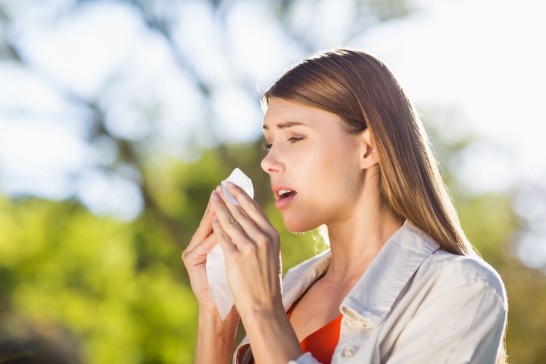Am I Suffering from Allergies? Or Something Else?
There is a wide range of variability from person to person when it comes to allergies. The unique circumstances of each person and their environment as well as what type of symptoms occur, how often they occur, and how troublesome they are all have significant meaning.
Gathering this important clinical information is vital to providers as they are trying to determine if allergies may be playing a role. The ability to identify an association between allergic symptoms and allergen exposures is key and sometimes even definitive in deciding to proceed with allergy testing or immunotherapy.
An easy to use, simple to use, and quick-to-complete symptom screening tool is available in allergy clinics offering United Allergy Service’s line of allergy care options. This screening form offers standardization for this critical initial clinical investigation. It offers the opportunity to focus on seven core symptoms that can be strongly indicative of allergic disease.
The screening tool allows providers to assess the presence of symptoms with a strong indication for allergic disease, the frequency of these symptoms, and the presence of other allergic conditions such as atopic dermatitis and asthma. The greater the symptom score, and the more regular or frequent the symptoms occur, the higher the consideration for an allergy skin test should be. Atopic conditions such as atopic dermatitis and asthma, as well as symptom modifying medication use that has failed to control symptoms, also build more strength in the decision to undergo an allergy test.
This screening tool can also help to capture valuable information even after patients are scheduled for or have already had their allergy test. It can help determine the need for allergy testing and possibly immunotherapy, as well as track the decrease in symptoms and the positive impact immunotherapy has had. Completion of this symptom screening form can also help identify an increase in tolerance to a specific allergen that was previously a trigger, any reduction in medications previously used to lessen allergy symptoms, and any additional clinical benefits noted such as a reduction in asthma exacerbations, sinus infections, ear infections, or dermatitis.
If you feel you may be suffering from allergies, we encourage screening utilizing an allergy symptom screening tool like the one available in UAS allergy clinics or the online allergy quiz available on our website. It’s a great way to start your journey of improving allergy symptoms and your quality of life!
A Deep Dive into Summertime Allergies
As the warmth of summer graces us with its presence, many of us are eager to embrace outdoor activities and soak up the sun. However, along with the barbecues, beach days, and sunny strolls, comes an uninvited guest: allergies. For many people, summer is synonymous with sniffling, sneezing, itchy eyes, and other symptoms that signal the onset of seasonal allergies. Let’s delve into what exactly causes summertime allergies, how they impact us, and what we can do to manage them better.
The Cause: Summer Allergens
Seasonal allergies, also known as hay fever or allergic rhinitis, are triggered by allergens—substances that the immune system mistakenly identifies as harmful. When the body encounters these allergens, it responds by producing a type of antibody called Immunoglobulin E (IgE), leading to an allergic reaction.
During the summer months, the primary culprits are pollens from grasses, weeds, and trees. While spring is most commonly associated with tree pollen allergies, summertime often sees a rise in grass pollens (such as Timothy grass, Kentucky bluegrass, and ryegrass) and weed pollens (like ragweed, sagebrush, and pigweed). Mold spores, which thrive in warm, humid environments, also become more prevalent during summer, contributing to allergic symptoms.
The Impact: Symptoms of Summertime Allergies
The allergic reaction sparked by these allergens can result in a variety of allergy symptoms, many of which can be quite discomforting. These symptoms typically include:
- Sneezing
- Runny or congested nose
- Itchy, watery, or red eyes
- Coughing
- Itchy throat or ears
- Fatigue
These symptoms can severely affect an individual’s quality of life, leading to disturbed sleep, irritability, and an inability to fully enjoy outdoor activities during the summer season.

Managing Summertime Allergies
Various strategies can help manage the symptoms of seasonal allergies and make your summer a lot more enjoyable.
1. Awareness and Avoidance
Stay updated on local pollen forecasts available online such as the United Allergy Service Pollen Forecast or through mobile apps such as myAllergyPal®, and try to limit your outdoor activities on high pollen count days. Additionally, during these peak periods, keep your windows closed and use air conditioning to keep allergens at bay.
2. Allergy Medication
Over-the-counter antihistamines can be effective for relieving allergy symptoms like sneezing, itching, runny nose, and watery eyes. Decongestants may also help to relieve a stuffy nose. For those with severe symptoms, a provider may prescribe stronger medications or recommend allergy shots (immunotherapy).
3. Good Hygiene Practices
After spending time outdoors, be sure to shower and change into fresh clothes to remove any pollen that may have settled on your skin and clothing. It’s also beneficial to wash your hands often and avoid touching your face, especially your eyes, to prevent direct introduction of allergens.
4. Home Environment Care
Use high-efficiency particulate air (HEPA) filters in your home to trap pollen and other allergens. Regular cleaning and vacuuming also help to keep your indoor environment allergen-free.
The Solution: Lasting Allergy Relief
Despite best efforts to manage allergy symptoms, over-the-counter medications and preventative measures might not be enough for some individuals. In such cases, it’s crucial to take the next step—getting tested for allergies. By identifying specific triggers, you can not only avoid those allergens but also receive targeted treatment for more effective symptom relief.
Through your provider at an allergy center near you, United Allergy Services offers comprehensive allergy testing that can pinpoint the exact allergens causing your discomfort. This personalized approach allows for a more accurate diagnosis and effective treatment plan.
For some, the path to relief could lie in immunotherapy, a treatment approach that helps the body build tolerance to allergens. United Allergy Services offers allergy shots (subcutaneous immunotherapy) and allergy drops (sublingual immunotherapy) tailored to your specific allergen sensitivities. Over time, immunotherapy can help to reduce or even eliminate your allergic responses, enabling you to fully enjoy summer.
In conclusion, while summertime allergies can put a damper on this vibrant season, there are many avenues to manage and overcome them, including avoidance, medication, and medical treatments like immunotherapy. Don’t let allergies hold you back—explore options with your provider at a local allergy center to find the best treatment path for you.
FSA/HSA Plans for Allergy Services
Environmental allergies are a common ailment that affects approximately 50 million Americans every year. Whether you suffer from year round or just seasonal allergies, you may be able to use your tax-free FSA/HSA funds to help you save money on education, testing, and treatments. If you struggle with allergy symptoms—itchy eyes, congestion, and non-stop sneezing—you know how tough the spring and summer months can be. Over-the-counter drugs can help, but sometimes these remedies aren’t enough. As you compare options, you may notice the hefty price tag. Luckily, your health savings account (HSA) or flexible spending account (FSA) may offer some savings to your allergy relief.
What Exactly is an FSA or HSA Health Care Plan?
Flexible Spending Accounts (FSA) or Health Savings Accounts (HSA) are medical savings accounts with tax benefits, designed to allow you to set aside pre-tax savings to go towards your treatments, healthcare and other medical expenses.
Can I Use My FSA/HSA Plan for Allergy Testing?
For the majority of healthcare plans environmental and food allergy testing is an eligible FSA/HSA expenditure, meaning they allow the tests as a qualified medical expense. To make sure you're covered, we recommend getting in touch with your provider to confirm your inclusions.
A qualified medical expense is defined in IRS Publication 502 as the cost of treatment, cure, diagnosis, mitigation or prevention of a disease. The expense must be used principally to prevent or help ease the symptoms of a physical/mental illness or disability in order to meet the criteria for HSA and FSA. Environmental sensitivity tests work to identify allergic triggers that may cause discomfort and allow you to avoid or mitigate the exposure. Similarly, food sensitivity tests identify digestive issues so you can alter your diet to try and prevent things like bloating, nausea and stomach cramps.
Other Allergy Related Questions?
Our team wants to help you make the most out of your benefits before they expire on January 1st. Visit our FAQ page for more insight, or find an Allergy Center near you by clicking here.
Summer Allergy Travel Tips
School is out, summer is in full swing, and it is prime time for summer vacations and traveling. Summer travel with environmental allergies, asthma, or food allergies may make planning a vacation seem like a daunting task. Not to worry! We can show how to keep summer allergy issues at bay during your staycation, beach trip or wine tour of your dreams.
Summer can be an ideal time to travel. The hot summer months can actually provide relief to some, like those with tree pollen allergies. Unfortunately for others, summer comes with its own allergy triggers. While tree pollen counts tend to be lower, the summer heat pushes grass and mold pollen to be higher. Ragweed begins to appear in the late summer and early fall months to kick off fall allergies. Pollen is not the only trigger you can expect; more stinging insects and hotter temperatures in summer months can complicate matters for asthma sufferers.
Summer Allergy Location Tips

Location is everything! One consideration is that pollen counts tend to be lower on the coast, so beaches may be a good option. The desert, or alternatively snowy mountain tops, can also be ideal for pollen, although maybe not for summer travel. Does your vacation involve hiking or mountain climbing? Dust mites do not prefer elevations above 2,500 feet, so that may be a great choice as well. Wherever you decide to go check the allergen forecasts for that area. You should also check current pollen counts each day there. If high pollen counts are in the forecast, consider planning inside activities during your trip.
Checking pollen counts may not be the only forecast to make sure to monitor. As the temperatures rise, you can expect the humidity to rise as well. Many who suffer from asthma can find their condition aggravated by the high temperatures and humid climate. When planning your time outside during the summer, check the air quality for low humidity and low ozone days. You can also avoid triggers by planning around the heat of the day when possible.
Packing for Vacation
Although your favorite swimsuit may be more fun, allergy control measures should equally be at the highest priority. Staying compliant to your recommended treatment protocol in the days before you leave is crucial. These measures will support well-maintained symptoms while traveling, and for the duration of the trip.
- Make sure to pack allergy medication and immunotherapy in a carry-on bag if traveling by plane.
- Try to keep medications in original packaging and pack all medication and allergen immunotherapy in a separate, clear bag.
- Any liquid or gel medications or immunotherapy will need to individually be 3-4 ounces or smaller. Consider purchasing travel sizes if standard sizes do not meet this requirement.
- Pack 1-2 days of additional medication or immunotherapy than what will be needed in case of delay when traveling.
- It may be beneficial to set a reoccurring alarm on a phone before leaving. Normal routines may change with travel and vacation plans.
- Finally, are you traveling out of the country? If you are traveling to a non-English speaking location, bring a list of your allergies in the native language. You may also learn to say or write “I’m allergic to _____.” in the local language.
Additionally, do not forget to pack any hypoallergenic hygiene products that you regularly use. Examples might be sunscreen, after sun cream, lotions, ointments, body wash, or laundry detergent. When searching for accommodations, remember that more and more hotels offer items like mattress and pillow covers or hypoallergenic linens so you may not have to pack your own. It may also be helpful to ask about smoke free rooms, away from humid, mold friendly pool areas if possible. If pet dander is a concern, take note of whether the location is “pet friendly”.
Summer Allergy Avoidance Tips
Air in enclosed spaces such as planes and trains can sometimes be extremely dry. Consider investing in nasal saline spray or washes, as well as portable humidifier. A humidifier will likely also be beneficial if staying in a hotel for more than a night or two. Staying well hydrated with water and non-caffeinated beverages will also greatly help you combat drying out. If traveling by car, considering utilizing the heat or air conditioning and keeping windows closed. Also, turning on the heat or air 10 minutes before departure can help clear vents of any residual allergen particles.
While enjoying your destination, remember that peak pollen times are typically early in the day (specifically 5am 10am). Scheduling desired outdoor activities for later in the day or just before dusk may help to reduce exposures. Similarly to when you are home, a daily shower is helpful for allergen avoidance. Showering before bed will help to wash away allergens that have adhered themselves to your skin or hair. This is especially important to maintain so that your pillow, sheets, and the immediate space you breathe in all night is allergen free.
Insect Allergies
Another aspect of the summer allergy concerns may be insects. If stinging insect allergies are present planning ahead can alleviate a lot of anxiety and allow for a smooth trip. Always make sure to carry a minimum of two epinephrine auto injectors if it has been prescribed to you or a loved one. Make sure the epinephrine autoinjector is carried in a way it can be accessed and administered within 60 seconds of a need arising.
If you or a loved one does have life threatening allergies, it is a good idea to check with your health insurance and ensure you know where to seek medical care should the need arise while you are out of town. You may also consider carrying an allergy identification card. It can be helpful to keep a card in your wallet listing your allergies, and also emergency contact information and your healthcare provider information. This can be especially important for children who may be summer camps or staying overnight with friends or family.
Food Allergies
If food allergies are present, packing your own meals or snacks may make traveling easier. Preparing food yourself is always the safest option. Alternatively, research the local dining hot spots you wish to visit in advance of leaving for your trip. This allows you to identify safe selections from the menu or you can call to request proper menu accommodations. You may still consider packing your own snacks if you have food allergies. While it may be possible to plan meals around food allergies, snacks often present more of a challenge. Pack allergy friendly snacks, especially if lengthy plane rides are involved.
Amanda Hofmann, MPAS, PA-C, is a graduate of Duquesne University, in Pittsburgh, Pennsylvania. After spending eight years in clinical practice, she joined United Allergy Services as the vice president of clinical. Amanda is also the past president of the Association of PAs in Allergy, Asthma, and Immunology.
United Allergy Services is also on Facebook, LinkedIn, or Twitter. See other interesting and related articles on the UAS Blog.





